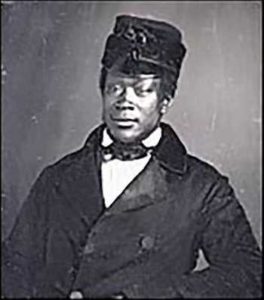
Steven Spencer Hill
The Steven Spencer Hill Ranch was built on this date in 1853. Located in Tuolumne County (central CA.), it is northeast of Gold Springs, on the slopes next to the Stanislaus River Canyon.
Steven Spencer Hill, a Black man, filed a claim for 160 acres of land on this date. Hill came to California during the Gold Rush of 1849 from Arkansas as a slave bondsman of Wood Tucker. When Tucker returned to Arkansas in 1853, Hill purchased his freedom and remained in California as a free man. Hill took Tucker's land and soon made it an enterprising property. Initially, 40 acres were cleared and planted, and Hill built a small cabin.
He prospected part-time successfully at Gold Springs. The Columbia Gazette (April 1, 1854) reported: "On Steve's claim, at Gold Springs, a beautiful specimen was taken out, weighing 9 ounces, pure gold." With his mining wealth, Hill could buy the equipment and stock needed to improve his ranch and, by the spring of 1854, had one of the most prosperous ranches in the country. Unfortunately, the productive ranch was not his property for very long. Owen R. Rozier moved onto the ranch in March 1854, claiming that Hill had not been emancipated (freed) and, therefore, was still Wood Tucker's property and Hill, a fugitive slave.
Under the California Fugitive Labor Act of April 15, 1852, the court could have Hill arrested and removed to Arkansas if Tucker would substantiate Rozier's allegation and empower him to act as his agent. During a hearing on the matter, Tucker claimed by letter that Hill was still his slave and authorized Rozier to act on his behalf in guaranteeing Hill's return. Hill tried unsuccessfully to sell the property, then fled the ranch on learning of Tucker's deceit. He was soon arrested and tried by a Judge who ordered him back to Arkansas. In September 1854, Rozier booked passage to Arkansas and Hill aboard the steamer Urilda from Stockton. Hill again escaped. While Hill gained his freedom, he never regained title to his property.
This experience of land redistribution and Black disenfranchisement was common in nineteenth-century California, a state that entered the Union as a non-slave, free state.